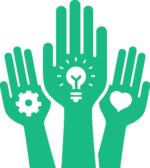The general ideas behind Competendo are based on shaping and strengthening individuals’ key competencies. Thanks to key competencies, people can integrate what they’ve learned into their lives as active citizens and agents for social change. In this way, the result of a learning process is not only knowledge, but also practical skills and attitudes. We hope that these competences will help people be better prepared to thrive in complex social situations.
Key Competences and Learning
Competence-centred learning processes cover a broad range of skills, knowledge, and attitudes that one needs for successful problem-solving techniques in modern society. They help the individual to develop their key competences and have an active attitude towards the idea of life-long learning.
Experiential learning is a holistic process of individual development that brings relevance to the knowledge, skills, and attitudes of the participants. It combines the learning opportunities of everyday life and scholastic institutions with all other possible activities that are available in society - in example in civil initiatives, informal groups, sport clubs, or working place.
Empowerment
Empowerment is the learning and developmental process of raising social, spiritual, economic, and political capacities of individuals or communities. We promote it as a tool to help each individual to act self-responsibly and with a sense of purpose. We hope to equip individuals with skills, knowledge, and competencies that will promote empathy and a desire to share their influence and power as self-responsible individuals.
Group-related and Interpersonal Aspects
Following the idea of competence-based learning and empowerment, we need to improve the social skills. Since social life is shaped through group and intergroup collaboration, we need to transform our social groups into collectives which encourage peer-involvement-style learning in order to create a new understanding of the role of teachers or trainers as
facilitators. This section includes theory aspects on teamwork, group dynamics, communication, diversity and conflict management.
Definitions & Terminology
On this page we collect definitions to most important terms and concepts as well as links to external glossaries and sources.








